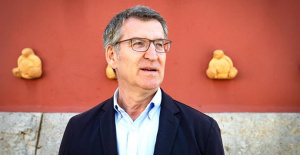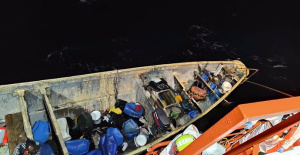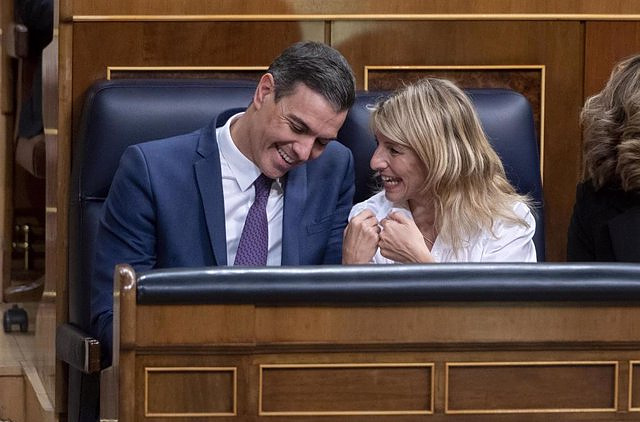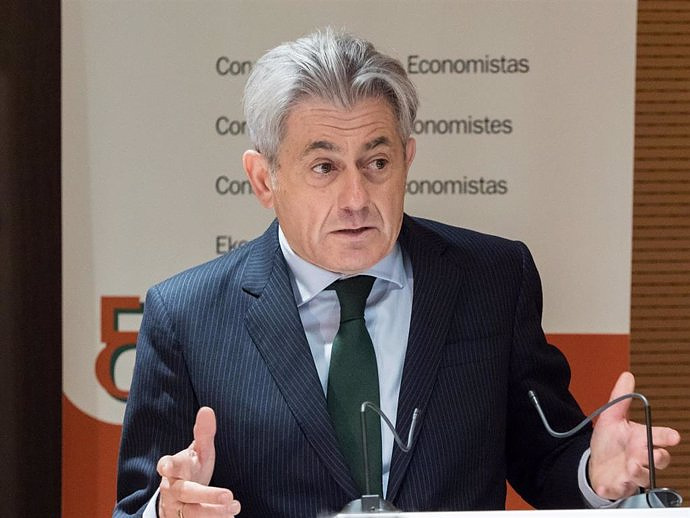Sánchez will take a dozen ministers to the appointment, among whom there will be none from United We Can
MADRID, 29 Ene. (EUROPA PRESS) -
The summit with Morocco next week will once again highlight the division in the government coalition on foreign policy issues, with the absence of all the ministers of Unidas Podemos from the appointment to which Pedro Sánchez will be accompanied by a dozen ministers .
The High Level Meeting (RAN) between the two countries, the first since 2015, seals the new stage in the relationship that began after the Prime Minister, Pedro Sánchez, transferred King Mohamed VI, whom Spain considers the autonomy plan for the Sahara as "the most solid, credible and realistic basis" for a solution to the conflict.
This step, which made it possible to recover a relationship frozen by the reception in Spain of the leader of the Polisario Front, Brahim Ghali, and the position regarding the Sahara, was harshly rejected from United We Can, placing the minority partner on the same side as the PP in the rejection to what is considered a turn in a historical policy.
This difference in position regarding the question of the former Spanish colony has continued in recent months and has once again become evident after learning that the summit would take place on February 1 and 2.
Thus, the second vice president and head of Labor, Yolanda Díaz, the Minister of Social Rights and leader of Podemos, Ione Belarra, and the head of Consumption and federal coordinator of IU, Alberto Garzón, made it known that they would not attend.
The Minister of Foreign Affairs, European Union and Cooperation, José Manuel Albares, downplayed these absences, defending that all the ministers never go to summits with other countries, but rather it depends on the planned agenda.
"Those ministers who have issues to discuss with their Moroccan counterparts will go to Rabat," he stressed, while indicating that the forecast is that Sánchez will be accompanied by a dozen ministers.
Added to this is the presence of members of Podemos and Izquierda Unida at the recent Polisario Front congress in the Tindouf refugee camps (Algeria) in which Brahim Ghali was re-elected as Secretary General, with which they wanted to make it clear their support for the Saharawi cause against Morocco.
On the other hand, the disagreement regarding the policy towards Morocco has caused another unexpected event: the PSOE vote against a resolution in the European Parliament in which Morocco was criticized and its possible involvement in bribing MEPs was pointed out.
From the PSOE it was argued that the vote against was "responsible and in favor of frank bilateral relations based on dialogue and understanding" with the Alaouite kingdom, denying that it was detrimental to the Government's commitment to the defense of Human Rights. Humans.
For his part, Sánchez only limited himself to saying that the PSOE did not share "some elements" of the resolution and when this week several parliamentary spokesmen asked him for explanations for the direction of the vote of the Socialist MEPs, the President of the Government limited himself to highlighting the benefits of the new stage in the relationship with Morocco.
"It is convenient for us to maintain the best of relations, not only for Spain but for the EU," he said, arguing in this sense that trade with Morocco increased by 33% last year to reach almost 10,000 million and the reduction in arrivals of irregular immigrants.
According to data from the Ministry of the Interior, he indicated, the reduction has been 26%, while according to Frontex the reduction in arrivals to Andalusia was 21% and to the Canary Islands 31%. "Of all the migratory routes to Europe, the only one that has decreased is that from Morocco to Spain," he said.

 Exploring Cardano: Inner Workings and Advantages of this Cryptocurrency
Exploring Cardano: Inner Workings and Advantages of this Cryptocurrency Seville.- Economy.- Innova.- STSA inaugurates its new painting and sealing hangar in San Pablo, for 18 million
Seville.- Economy.- Innova.- STSA inaugurates its new painting and sealing hangar in San Pablo, for 18 million Innova.- More than 300 volunteers join the Andalucía Compromiso Digital network in one month to facilitate access to ICT
Innova.- More than 300 volunteers join the Andalucía Compromiso Digital network in one month to facilitate access to ICT Innova.-AMP.- Ayesa acquires 51% of Sadiel, which will create new technological engineering products and expand markets
Innova.-AMP.- Ayesa acquires 51% of Sadiel, which will create new technological engineering products and expand markets Milei charges against the Spanish Government in response to some "slander and insults" by Minister Óscar Puente
Milei charges against the Spanish Government in response to some "slander and insults" by Minister Óscar Puente Feijóo, on the UN report: "We are not going to forget either the dictatorship or the terrorist group"
Feijóo, on the UN report: "We are not going to forget either the dictatorship or the terrorist group" A total of 19,887 migrants have arrived in Spain so far this year, 190% more, 15,982 of them in the Canary Islands
A total of 19,887 migrants have arrived in Spain so far this year, 190% more, 15,982 of them in the Canary Islands C-LM, Extremadura or Madrid, among the CC.AA that announce the creation of Bullfighting Awards after the suppression of Culture
C-LM, Extremadura or Madrid, among the CC.AA that announce the creation of Bullfighting Awards after the suppression of Culture How Blockchain in being used to shape the future
How Blockchain in being used to shape the future Not just BTC and ETH: Here Are Some More Interesting Coins Worth Focusing on
Not just BTC and ETH: Here Are Some More Interesting Coins Worth Focusing on Faraday UPV presents the 'Origin' rocket to exceed 10 km of flight: "It is the beginning of the journey to space"
Faraday UPV presents the 'Origin' rocket to exceed 10 km of flight: "It is the beginning of the journey to space" The Generalitat calls for aid worth 4 million to promote innovation projects in municipalities
The Generalitat calls for aid worth 4 million to promote innovation projects in municipalities UPV students design an app that helps improve the ventilation of homes in the face of high temperatures
UPV students design an app that helps improve the ventilation of homes in the face of high temperatures Ivace and promotes a less invasive device for the early detection of prostate cancer
Ivace and promotes a less invasive device for the early detection of prostate cancer A million people demonstrate in France against Macron's pension reform
A million people demonstrate in France against Macron's pension reform Russia launches several missiles against "critical infrastructure" in the city of Zaporizhia
Russia launches several missiles against "critical infrastructure" in the city of Zaporizhia A "procession" remembers the dead of the Calabria shipwreck as bodies continue to wash up on the shore
A "procession" remembers the dead of the Calabria shipwreck as bodies continue to wash up on the shore Prison sentences handed down for three prominent Hong Kong pro-democracy activists
Prison sentences handed down for three prominent Hong Kong pro-democracy activists ETH continues to leave trading platforms, Ethereum balance on exchanges lowest in 3 years
ETH continues to leave trading platforms, Ethereum balance on exchanges lowest in 3 years Investors invest $450 million in Consensys, Ethereum incubator now valued at $7 billion
Investors invest $450 million in Consensys, Ethereum incubator now valued at $7 billion Alchemy Integrates Ethereum L2 Product Starknet to Enhance Web3 Scalability at a Price 100x Lower Than L1 Fees
Alchemy Integrates Ethereum L2 Product Starknet to Enhance Web3 Scalability at a Price 100x Lower Than L1 Fees Mining Report: Bitcoin's Electricity Consumption Declines by 25% in Q1 2022
Mining Report: Bitcoin's Electricity Consumption Declines by 25% in Q1 2022 Oil-to-Bitcoin Mining Firm Crusoe Energy Systems Raised $505 Million
Oil-to-Bitcoin Mining Firm Crusoe Energy Systems Raised $505 Million Microbt reveals the latest Bitcoin mining rigs -- Machines produce up to 126 TH/s with custom 5nm chip design
Microbt reveals the latest Bitcoin mining rigs -- Machines produce up to 126 TH/s with custom 5nm chip design Bitcoin's Mining Difficulty Hits a Lifetime High, With More Than 90% of BTC Supply Issued
Bitcoin's Mining Difficulty Hits a Lifetime High, With More Than 90% of BTC Supply Issued The Biggest Movers are Near, EOS, and RUNE during Friday's Selloff
The Biggest Movers are Near, EOS, and RUNE during Friday's Selloff Global Markets Spooked by a Hawkish Fed and Covid, Stocks and Crypto Gain After Musk Buys Twitter
Global Markets Spooked by a Hawkish Fed and Covid, Stocks and Crypto Gain After Musk Buys Twitter Bitso to offset carbon emissions from the Trading Platform's ERC20, ETH, and BTC Transactions
Bitso to offset carbon emissions from the Trading Platform's ERC20, ETH, and BTC Transactions Draftkings Announces 2022 College Hoops NFT Selection for March Madness
Draftkings Announces 2022 College Hoops NFT Selection for March Madness



























